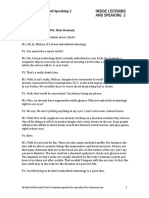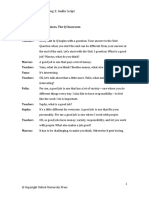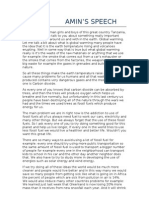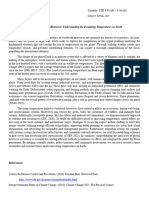Inside Listening and Speaking 2 Unit 5 Assessment Audio Script
Inside Listening and Speaking 2 Unit 5 Assessment Audio Script
Uploaded by
Lâm DuyCopyright:
Available Formats
Inside Listening and Speaking 2 Unit 5 Assessment Audio Script
Inside Listening and Speaking 2 Unit 5 Assessment Audio Script
Uploaded by
Lâm DuyOriginal Title
Copyright
Available Formats
Share this document
Did you find this document useful?
Is this content inappropriate?
Copyright:
Available Formats
Inside Listening and Speaking 2 Unit 5 Assessment Audio Script
Inside Listening and Speaking 2 Unit 5 Assessment Audio Script
Uploaded by
Lâm DuyCopyright:
Available Formats
Inside Listening and Speaking 2
Unit 5 Assessment
AUDIO SCRIPT
[M1: Male Student; F1: Female Student]
M1: Hi, Sophie. Are you ready to practice our presentation?
F1: Sure, Jack. I’ve organized my notes. I thought we could start by talking about 1. the
causes and then 2. offer some solutions.
M1: I think we should discuss the effects before we propose a solution.
F1: You’re right. Okay, so the causes: There are several greenhouse gases responsible
for global warming. Most gases come from burning fossil fuels, such as coal and oil.
Emissions from cars, factories, and the production of electricity all contribute to global
warming. The gas that causes the most warming is carbon dioxide, or CO2. Another gas
is the methane released from landfills and agriculture—especially from the digestive
systems of grazing animals such as cows. There’s also nitrous oxide from fertilizers and
gases used for refrigeration. Besides greenhouses gases, there’s the loss of trees from
the destruction of rainforests such as the Amazon. Trees store CO2 and release oxygen,
so fewer trees means more CO2 in the atmosphere. The warmer atmosphere melts the
polar sea ice and causes the sea level to rise. The sea level has risen by six to nine
inches over the past 100 years. Some scientists predict that the sea level could rise 6
more feet by the year 2100. That’s enough to put a lot of coastal cities under water.
M1: So one of the main effects of global warming is the rise in the sea level.
F1: Right. Now, the solutions. I think a lot of people feel helpless. They don’t think they
can do anything on a personal level. They want to leave it up to the government and
scientists to solve the problem.
M1: Yeah, the government could introduce laws controlling the use of vehicles.
Vehicles such as cars and trucks produce more than 1.5 billion metric tons of CO2 a
year. There should be a limit on the number of vehicles and how often people are
allowed to drive them. We should have a law that says people can only drive 5 hours a
week.
F1: Hm, I think most people wouldn’t accept that law. What about employees who need
to drive an hour to get to work? That’s already 10 hours a week.
M1: Yeah, that’s true. Well, maybe people could carpool or use public transportation
more often.
F1: Good. I agree with that. What else?
© Oxford University Press. Permission granted to reproduce for classroom use. 1
Inside Listening and Speaking 2
Unit 5 Assessment
M1: We have no choice but to limit household waste. For example, I think plastic bags
should be banned.
F1: But a lot of people depend on plastic bags every day.
M1: Well, plastic bags have only been around since the 1970s. We somehow managed
life before them. I think some people don’t realize that it takes a lot of energy to make
plastic. At least plastic bottles are recycled, but many cities don’t recycle plastic bags.
So trillions of plastic bags end up in landfills. Even incinerating, or burning, plastic bags
uses fossil fuels that produce greenhouse gases. And a lot of plastic bags end up in the
ocean where they kill millions of marine animals such whales, dolphins, and birds.
F1: Yeah, people must either reuse plastic bags or stop using them altogether.
M1: Right. Everyone should use fabric bags to carry their groceries. And supermarkets
must not be allowed to offer plastic bags. Some states are already banning them, and
the European Union, China, India, and Australia all have bans. Okay, so let’s move on…
© Oxford University Press. Permission granted to reproduce for classroom use. 2
You might also like
- Unit 6Document18 pagesUnit 6Lutfi FadillahNo ratings yet
- Unit 2: Q2e Listening & Speaking 1: Audio ScriptDocument5 pagesUnit 2: Q2e Listening & Speaking 1: Audio ScriptHussein RahnemaNo ratings yet
- Reading Wuiz Hazırlık RE3 1-3Document13 pagesReading Wuiz Hazırlık RE3 1-3Kübra Şendoğan100% (1)
- Q2e Listening and Speaking 5 Unit 1: Test ADocument2 pagesQ2e Listening and Speaking 5 Unit 1: Test AThu Tran Nguyen MinhNo ratings yet
- Passive Causative ESL Quiz 2Document4 pagesPassive Causative ESL Quiz 2Nilson Guevara BenavidesNo ratings yet
- The Present Perfect: Chapter TestDocument2 pagesThe Present Perfect: Chapter TestCami Cerneanu50% (2)
- ILS SB4 U05 Test ScriptDocument2 pagesILS SB4 U05 Test ScriptLâm DuyNo ratings yet
- Inside Listening and Speaking 2 Unit 3 Assessment Audio ScriptDocument2 pagesInside Listening and Speaking 2 Unit 3 Assessment Audio ScriptLâm DuyNo ratings yet
- AudioScript U1 To U8Document45 pagesAudioScript U1 To U8Long ThanhNo ratings yet
- Week 12 Announcements Lead in Unit 7 - Cities Nature + Past ContinuousDocument87 pagesWeek 12 Announcements Lead in Unit 7 - Cities Nature + Past ContinuousHuyền Nguyễn MinhNo ratings yet
- Lars2 AnswersDocument14 pagesLars2 Answersyusuf ceribasNo ratings yet
- Listening and Speaking Intro Q: Skills For Success Unit 7 Student Book Answer KeyDocument3 pagesListening and Speaking Intro Q: Skills For Success Unit 7 Student Book Answer KeySamet KayaNo ratings yet
- Q3eSE LS2 U01A StudentDocument8 pagesQ3eSE LS2 U01A StudentNawal ALMALKINo ratings yet
- Unit 8 CitiesDocument4 pagesUnit 8 CitiesJorn TravoltaNo ratings yet
- Q2eSE LS1 U07 AudioScriptDocument6 pagesQ2eSE LS1 U07 AudioScriptHanaa Bin MerdahNo ratings yet
- Unit 2 Why Do We Study Other CulturesDocument9 pagesUnit 2 Why Do We Study Other CulturesTuyet Thi Anh LyNo ratings yet
- 436136651-Q2eSE-LS1-U06-AudioScript-đã chuyển đổiDocument9 pages436136651-Q2eSE-LS1-U06-AudioScript-đã chuyển đổiVẫn Huỳnh ThịNo ratings yet
- Reading and Writing Intro Q: Skills For Success Unit 1 Student Book Answer KeyDocument3 pagesReading and Writing Intro Q: Skills For Success Unit 1 Student Book Answer KeyEmad AlkadahieNo ratings yet
- Unit 1 - ArchitectureDocument22 pagesUnit 1 - Architecturennhi06102003No ratings yet
- Grammar Hsang Ex12,13Document3 pagesGrammar Hsang Ex12,13Sang NguyễnNo ratings yet
- Q2e Rw1 Q Classroom AudioscriptsDocument8 pagesQ2e Rw1 Q Classroom AudioscriptsHanaa Bin MerdahNo ratings yet
- Unit 5: Q2e Listening & Speaking 1: Audio ScriptDocument5 pagesUnit 5: Q2e Listening & Speaking 1: Audio ScriptTuanNo ratings yet
- Bai Tap Ren Luyen Ky Nang in The Text Book - All TasksDocument17 pagesBai Tap Ren Luyen Ky Nang in The Text Book - All TasksHuỳnh AnhNo ratings yet
- A Special City in A Particular CountryDocument11 pagesA Special City in A Particular CountryThu TràNo ratings yet
- Inside Listening and Speaking 2 Unit 1 Answer Key Physiology Listening Vocabulary ActivitiesDocument5 pagesInside Listening and Speaking 2 Unit 1 Answer Key Physiology Listening Vocabulary ActivitiesZeeshan AnwerNo ratings yet
- Listening and Speaking 1 Q: Skills For Success Unit 3 Student Book Answer KeyDocument5 pagesListening and Speaking 1 Q: Skills For Success Unit 3 Student Book Answer KeyVy TườngNo ratings yet
- Listening and Speaking 2 Q: Skills For Success Unit 2 Student Book Answer KeyDocument5 pagesListening and Speaking 2 Q: Skills For Success Unit 2 Student Book Answer KeyNhật LinhNo ratings yet
- Q2eSE LS1 U06 AudioScriptDocument6 pagesQ2eSE LS1 U06 AudioScriptHanaa Bin MerdahNo ratings yet
- PDF Great Writing 3 Answer Key - CompressDocument16 pagesPDF Great Writing 3 Answer Key - Compresstranquoctuan0204No ratings yet
- Listening and Speaking 2 Q: Skills For Success Unit 3 Student Book Answer KeyDocument3 pagesListening and Speaking 2 Q: Skills For Success Unit 3 Student Book Answer KeyBelan Jamal18No ratings yet
- Q2e LS1 U04 AnswerKeyDocument4 pagesQ2e LS1 U04 AnswerKeyMai Le Lam Linh B1708270No ratings yet
- Unit 3: Q2e Listening & Speaking 1: Audio ScriptDocument5 pagesUnit 3: Q2e Listening & Speaking 1: Audio ScriptVẫn Huỳnh ThịNo ratings yet
- Q2e LS1 U01 AnswerKeyDocument5 pagesQ2e LS1 U01 AnswerKeyvovanduy0805No ratings yet
- Lesson 7 - How Do Many Hearing-Impaired People TalkDocument10 pagesLesson 7 - How Do Many Hearing-Impaired People TalkJamille NguyenNo ratings yet
- SSM120 410007 Unit5Document41 pagesSSM120 410007 Unit5Trí Phạm MinhNo ratings yet
- Q3eSE LS2 U02A StudentDocument8 pagesQ3eSE LS2 U02A StudentNawal ALMALKI0% (1)
- EIC 4 Unit Test 2Document6 pagesEIC 4 Unit Test 2Trần Chí TrườngNo ratings yet
- Revision Unit 3 - R&W - Attempt ReviewDocument4 pagesRevision Unit 3 - R&W - Attempt ReviewТУУЛ Бат-ЭрдэнэNo ratings yet
- Effective: Academic WritingDocument9 pagesEffective: Academic Writingགར་ཏི སུ་རེན་དརNo ratings yet
- RE 2 Unit 1 & 2 Reading Questions For Quiz 1Document8 pagesRE 2 Unit 1 & 2 Reading Questions For Quiz 1Kübra ŞendoğanNo ratings yet
- Pathways Reading, Writing, and Critical Thinking 2e: Level 1 Unit 1 Test Name: - Class: - DateDocument13 pagesPathways Reading, Writing, and Critical Thinking 2e: Level 1 Unit 1 Test Name: - Class: - DateshadyNo ratings yet
- Pathways LS Student Book Level 3 Unit 1 Sample Unit PDFDocument11 pagesPathways LS Student Book Level 3 Unit 1 Sample Unit PDFСардорбек ПадехилийNo ratings yet
- Reading Explorer 1 - 1Document14 pagesReading Explorer 1 - 1Trà Giang LêNo ratings yet
- Achievement Test New Frontiers 2Document22 pagesAchievement Test New Frontiers 2harryanh100% (1)
- Take-Home Quiz #5 (5B)Document10 pagesTake-Home Quiz #5 (5B)노진성100% (1)
- Level 4 - Extra Comprehension Questions SSDocument24 pagesLevel 4 - Extra Comprehension Questions SSNgọc LinhNo ratings yet
- Q3e LS2 U06 AnswerKeyDocument3 pagesQ3e LS2 U06 AnswerKeyMinh TranNo ratings yet
- Unit Test 1 Listening and Speaking PDFDocument5 pagesUnit Test 1 Listening and Speaking PDFBerkay Enes BorekciNo ratings yet
- Q3e LS3 U04A StudentDocument11 pagesQ3e LS3 U04A StudentserparspbNo ratings yet
- Q3e LS2 U07 AnswerKeyDocument2 pagesQ3e LS2 U07 AnswerKeyMinh TranNo ratings yet
- Q3e LS3 U07 ExtraVocabularyDocument1 pageQ3e LS3 U07 ExtraVocabularyꂅᏒꂅภ ᕱᏒᏕᎥภNo ratings yet
- Q3e RW Placement Test A StudentDocument5 pagesQ3e RW Placement Test A StudentPilot SoydanNo ratings yet
- Assignment 1 - Overpopulation Fuels MegacitiesDocument1 pageAssignment 1 - Overpopulation Fuels MegacitiesRoselyn MarieNo ratings yet
- Listening and Speaking 2 Q: Skills For Success Unit 1 Student Book Answer KeyDocument4 pagesListening and Speaking 2 Q: Skills For Success Unit 1 Student Book Answer KeyTrâm Lâm100% (1)
- Unit 4 Who Make Me LaughDocument3 pagesUnit 4 Who Make Me LaughLe Doan Duy SK20V1Q509No ratings yet
- Introduction To Paragraphs - Answer KeyDocument3 pagesIntroduction To Paragraphs - Answer KeySean JangeerNo ratings yet
- Listening Test 2 (LMS)Document5 pagesListening Test 2 (LMS)Trung Lê0% (1)
- Reading 1: Preparing To ReadDocument2 pagesReading 1: Preparing To Readaygun100% (1)
- Thuyết trìnhDocument2 pagesThuyết trìnhSienxNo ratings yet
- Amin's SpeechDocument3 pagesAmin's SpeechAmin IbrahimNo ratings yet
- Discourse Marker: NAME: Nurhalim NIM: 171160045Document5 pagesDiscourse Marker: NAME: Nurhalim NIM: 171160045adeNo ratings yet
- Engexam - info-FCE Listening Practice Test 8Document6 pagesEngexam - info-FCE Listening Practice Test 8Lâm DuyNo ratings yet
- Engexam - info-FCE Listening Practice Test 10Document7 pagesEngexam - info-FCE Listening Practice Test 10Lâm DuyNo ratings yet
- Engexam - info-FCE Listening Practice Test 9Document7 pagesEngexam - info-FCE Listening Practice Test 9Lâm DuyNo ratings yet
- Engexam - info-FCE Listening Practice Test 12Document6 pagesEngexam - info-FCE Listening Practice Test 12Lâm DuyNo ratings yet
- Engexam - info-FCE Listening Practice Test 4Document6 pagesEngexam - info-FCE Listening Practice Test 4Lâm DuyNo ratings yet
- Technology - Test CompilationDocument126 pagesTechnology - Test CompilationLâm DuyNo ratings yet
- Engexam - info-FCE Listening Practice Test 3Document6 pagesEngexam - info-FCE Listening Practice Test 3Lâm DuyNo ratings yet
- Engexam - info-FCE Listening Practice Test 2Document6 pagesEngexam - info-FCE Listening Practice Test 2Lâm DuyNo ratings yet
- Advanced Practice Tests (KEY) - Trang-36-52Document17 pagesAdvanced Practice Tests (KEY) - Trang-36-52Lâm DuyNo ratings yet
- Education TestDocument128 pagesEducation TestLâm DuyNo ratings yet
- FCE Practice Tests Plus 2Document22 pagesFCE Practice Tests Plus 2Lâm DuyNo ratings yet
- Environment - Test CompilationDocument216 pagesEnvironment - Test CompilationLâm DuyNo ratings yet
- PrismReading L4 SB U02Document20 pagesPrismReading L4 SB U02Lâm DuyNo ratings yet
- ILS SB4 U04 Test ScriptDocument2 pagesILS SB4 U04 Test ScriptLâm DuyNo ratings yet
- Inside Listening and Speaking 4 Unit 2 Assessment Audio ScriptDocument2 pagesInside Listening and Speaking 4 Unit 2 Assessment Audio ScriptLâm DuyNo ratings yet
- Inside Listening and Speaking 4 Unit 2 Assessment Audio ScriptDocument2 pagesInside Listening and Speaking 4 Unit 2 Assessment Audio ScriptLâm DuyNo ratings yet
- Homework Causes Global WarmingDocument8 pagesHomework Causes Global Warmingafnambrcuzwdyk100% (1)
- Global Warming Through The Eyes of The Filipino Secondary Students: A Research ReviewDocument3 pagesGlobal Warming Through The Eyes of The Filipino Secondary Students: A Research ReviewJofel CañadaNo ratings yet
- Cowichan Valley CitizenDocument7 pagesCowichan Valley Citizenjamaya1No ratings yet
- Writing t2 Topic EnvironmentDocument13 pagesWriting t2 Topic EnvironmentLê Đình Việt KhanhNo ratings yet
- Chapter Vi StsDocument2 pagesChapter Vi StsCherry Ann OlasimanNo ratings yet
- 2 Understanding Disaster and Climate ChangeDocument24 pages2 Understanding Disaster and Climate ChangeDILG Manolo FortichNo ratings yet
- Intertek Carbon Footprint Services BrochureDocument2 pagesIntertek Carbon Footprint Services BrochureGeoffrey NyasimiNo ratings yet
- Environmental Science: Quarter 3-Module 3: Impact of Climate Change On The EnvironmentDocument20 pagesEnvironmental Science: Quarter 3-Module 3: Impact of Climate Change On The EnvironmentAshMere Montesines86% (7)
- Transcript - Greta ThunbergDocument2 pagesTranscript - Greta Thunbergayu wulandariNo ratings yet
- Tugas Bing (Analisa Passive Voice)Document3 pagesTugas Bing (Analisa Passive Voice)SalsaDwi NovitaNo ratings yet
- Climate Policies: Prof. Dr. Mohammad Amir Hossain HossainDocument8 pagesClimate Policies: Prof. Dr. Mohammad Amir Hossain HossainGolam MowlaNo ratings yet
- NCA3 Full Report 15 Biogeochemical Cycles LowResDocument24 pagesNCA3 Full Report 15 Biogeochemical Cycles LowResJoshua DasmariñasNo ratings yet
- Climate Change Mitigation and AdaptationDocument3 pagesClimate Change Mitigation and Adaptationlem002117No ratings yet
- Gec 12Document2 pagesGec 12John Carlo AbelleraNo ratings yet
- Net Zero Tracker For Ammonia Industry by WEFDocument14 pagesNet Zero Tracker For Ammonia Industry by WEFVem Ser CodhesNo ratings yet
- Xcel Energy Carbon Report - Mar 2019Document28 pagesXcel Energy Carbon Report - Mar 2019Inoa KonsultindoNo ratings yet
- Eng - Pharaprase HomeworkDocument3 pagesEng - Pharaprase Homeworkjeisel keziaNo ratings yet
- NSTP ReviewerDocument29 pagesNSTP ReviewerUmoji KimNo ratings yet
- حل تمرينDocument3 pagesحل تمرينmr6 sif ff100% (1)
- De On Tap HK1 Tieng Anh 11 Global de 1Document2 pagesDe On Tap HK1 Tieng Anh 11 Global de 1Thanh HằngNo ratings yet
- Santia Mustika Sari - Tugas Chapter 6 Cause and Effect 9 Nopember 2021Document6 pagesSantia Mustika Sari - Tugas Chapter 6 Cause and Effect 9 Nopember 2021Santia Mustika SariNo ratings yet
- Grade 9 Science LP Week 7Document15 pagesGrade 9 Science LP Week 7venicer balaodNo ratings yet
- Engl Assignment Expository EssayDocument2 pagesEngl Assignment Expository EssayCristine Ann DizonNo ratings yet
- Ulangan Akhir Semester Kelas XDocument6 pagesUlangan Akhir Semester Kelas XAufifillahKhairiyahNo ratings yet
- Kyoto Protocol: General BackgroundDocument3 pagesKyoto Protocol: General BackgroundMuhammad ZawarNo ratings yet
- Climate ChangeDocument13 pagesClimate ChangeJonathan BurgosNo ratings yet
- Chapter 11 - Climate Change, Energy Crisis and Environmental AwarenessDocument2 pagesChapter 11 - Climate Change, Energy Crisis and Environmental AwarenessKristine MorillaNo ratings yet
- Terra Green Magazine January 2022Document4 pagesTerra Green Magazine January 2022VandanaNo ratings yet
- Impact of Glaciers On The Hydrology of Kashmir Rivers:: A Case Study of Kolahoi GlacierDocument164 pagesImpact of Glaciers On The Hydrology of Kashmir Rivers:: A Case Study of Kolahoi GlacierZamNo ratings yet
- Environmental CrimeDocument13 pagesEnvironmental Crimenor ahlina muhd rodhiNo ratings yet









































































































